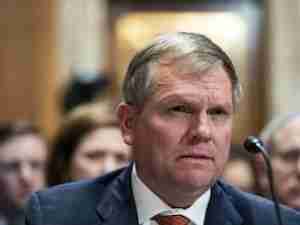President Joe Biden said he’ll seek to find some agreement on an infrastructure plan in a meeting with Republican congressional leaders at the White House on Wednesday.
Biden told reporters at the beginning of the meeting that he’d see if he could “reach some consensus on a compromise” on his infrastructure proposal with the House and Senate GOP leaders, Kevin McCarthy and Mitch McConnell.
“We’re going to talk a lot about infrastructure today to see if there’s any way we can reach a compromise that gets the peoples’ work done and is within the bounds of why we ran,” Biden said in brief remarks before reporters were ushered out of the Oval Office. “And that’s the purpose of this meeting.”
The White House is ramping up efforts to advance the president’s $4 trillion infrastructure and families plan, even as Republicans oppose his proposed spending and the tax hikes on the wealthy and corporations that would help fund it.
Biden’s meeting with McConnell, McCarthy and Senate Majority Leader Chuck Schumer and House Speaker Nancy Pelosi is the first official gathering of the so-called “Big Four” congressional leaders since the president’s inauguration. The timing is crucial—the White House has said it wants to see Congress advance the plans by Memorial Day.
As a candidate, Biden said the relationships he built during his three decades in the Senate could help pass bipartisan bills through the closely divided Congress. But he received no Republican votes for his stimulus package, and finding agreement on his sweeping economic plan could prove even more difficult.
GOP lawmakers have balked at the price tag for his plans, which would dramatically expand the social safety net along with funding new roads, bridges and rail lines.
McConnell said last week that “100% of my focus is on standing up to this administration,” a remark that put a damper on already-slim hopes that Biden could leverage his personal relationship with the longtime Republican leader to strike deals.
Yet the president has continued to keep the door open to compromise. He has said he is willing negotiate on the size of the package and raise the corporate tax rate to a number lower than the 28% he proposed. He’s planning to meet Thursday with a group of Republican senators—led by West Virginia’s Shelley Moore Capito—who have proposed a slimmed-down infrastructure plan.
McConnell later took the edge off his comments about Biden, saying, “I like him personally” but still indicated he won’t easily strike a deal with the president.
“I want to do business with the president, but he needs to be a moderate. He said he was going to be a moderate during the campaign. I haven’t seen that yet,” McConnell said in Kentucky.
McCarthy’s presence in the meeting was a potential source of added tension. Earlier Wednesday, at McCarthy’s urging House Republicans removed their third-ranking leader, Wyoming Representative Liz Cheney, in retribution for her criticism of former President Donald Trump, whom she blames for the Jan. 6 insurrection at the Capitol following his attempt to overturn Biden’s election.
McCarthy has sought Trump’s help to win control of the House in the 2022 midterm elections and has backed away from his own criticism of the former president.
Biden meanwhile faces pressure from the left flank of the Democratic Party not to allow bipartisan negotiations to bog down his agenda. Liberals have been wary of dealing with Republicans ever since lengthy negotiations over President Barack Obama’s health care law resulted in a diminished package that no GOP lawmakers voted to pass.
Should Biden fail to reach a compromise with Republicans, Democrats in Congress could use a procedural maneuver—known as budget reconciliation—to force through at least parts of his proposal without any GOP votes.
To do that, the White House would need all Democrats to back his spending plans, given the 50-50 split in the Senate. Biden spent the early part of the week shoring up Democratic support, meeting with key moderates Joe Manchin of West Virginia and Kyrsten Sinema of Arizona, who have both expressed reservations about advancing Biden’s agenda without bipartisan support.







